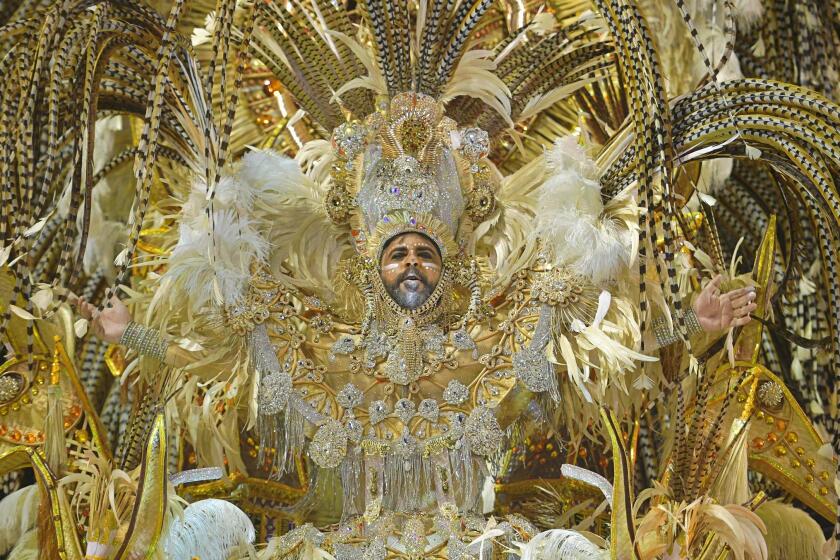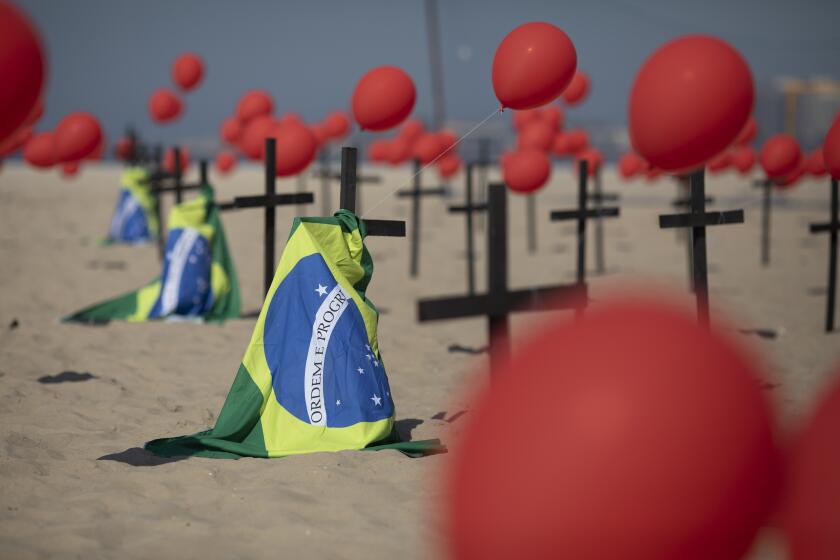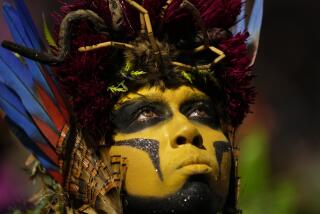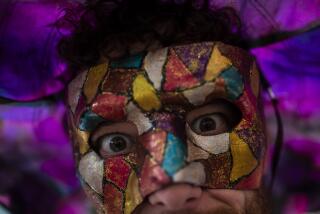Rio’s Carnival suspended for the first time in 108 years, thanks to coronavirus
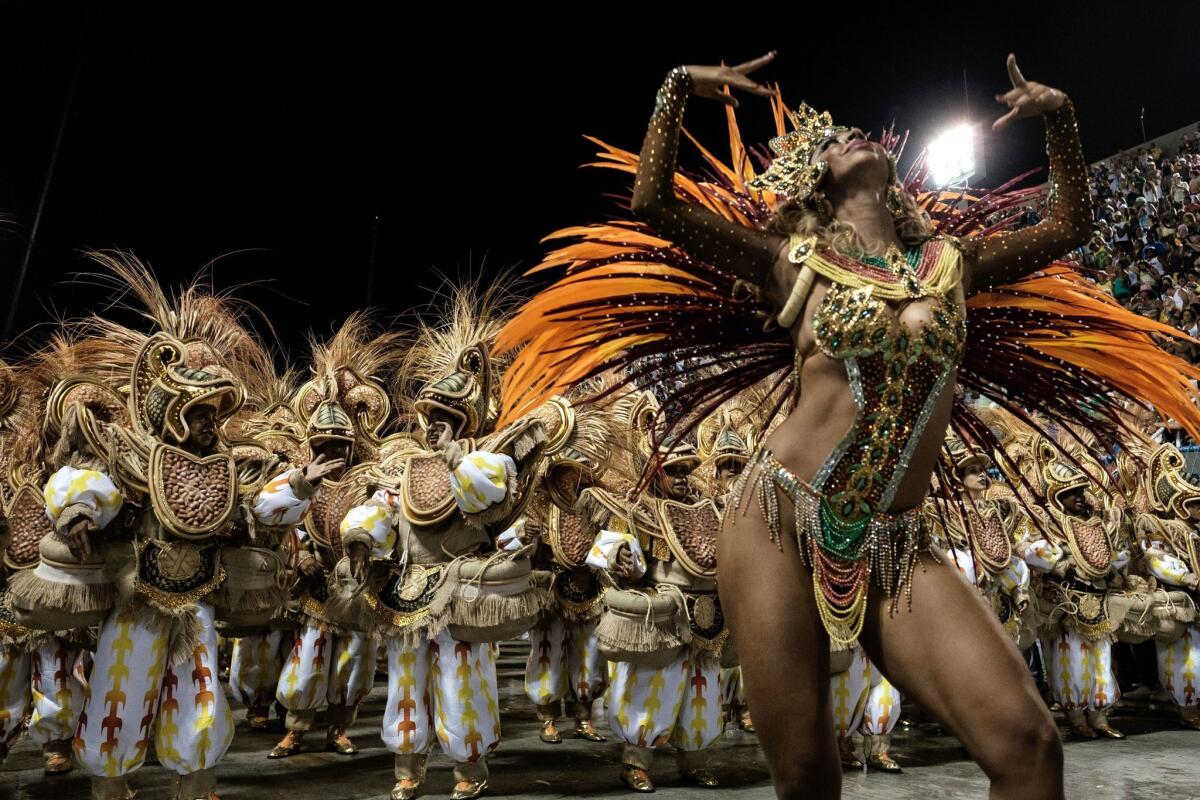
- Share via
RIO DE JANEIRO — The annual Carnival parade of flamboyant samba schools in Rio de Janeiro won’t be held in February as planned because of the coronavirus — the first time the over-the-top event has been disrupted in more than a century.
The decision is being characterized as a postponement, but no new date for the parade has been set.
Rio’s League of Samba Schools, or LIESA, announced Thursday night that the spread of the coronavirus has made it impossible to hold the traditional parades that are a cultural mainstay in the city and, for many residents, a livelihood.
“Carnival is a party upon which many humble workers depend. The samba schools are community institutions, and the parades are just one detail of all that,” Luiz Antonio Simas, a historian who specializes in Rio’s Carnival, said in an interview. “An entire cultural and productive chain was disrupted by COVID.”
Rio’s City Hall has yet to announce a decision about the Carnival street parties that also take place across the seaside city. But its tourism promotion agency said in a statement last week that without a coronavirus vaccine, it is uncertain when large public events can resume.
Brazil’s first confirmed coronavirus case was Feb. 26, one day after this year’s Carnival celebrations ended. As the number of infections grew, the samba schools that participate in the glitzy annual parade halted preparations for the 2021 event.
Nearly all of Rio’s samba schools are closely linked to working-class communities. Their processions include elaborate floats accompanied by tireless drummers and costumed dancers who sing at the top of their lungs to impress a panel of judges. Tens of thousands of spectators pack the bleachers of the arena, known as the Sambadrome, while tens of millions watch on television.
Before the schools began competing in the 1930s, Carnival was celebrated in dance halls and on the streets, Simas said. The parades entered the Sambadrome in the 1980s and have become Rio’s signature Carnival display.
The immense labor required for each show was already set back by restrictions on gatherings that the governor of Rio de Janeiro state imposed in March. Even with those measures, the Rio metropolitan region, home to 13 million people, so far has recorded more than 15,000 deaths from COVID-19.
Beneath the Sambadrome’s bleachers, the city created a homeless shelter for the vulnerable population during the pandemic.
Brazil surpassed 100,000 deaths from COVID-19 on Saturday, and five months after the first reported case, the country has not shown signs of crushing the disease.
Samba schools suspended float construction, costume-sewing, dance rehearsals and also social projects. The Mangueira school’s program in the favela, or shantytown, near downtown Rio that teaches music to children — keeping them away from crime and cultivating the school’s future drummers — hasn’t held classes since March.
The pulse of entire suburban cities like Nilopolis, whose population of 160,000 cheers the Beija-Flor samba school, has faded, Simas said.
Some performers resorted to odd jobs and gigs. Diogo Jesus, the lead dancer referred to as “master of ceremonies” in the Mocidade school, couldn’t make rent without his income from private events. He started driving for Uber and sewing masks to sell at a fair.
“It was a blow. We live Carnival all year round, and many people, when they realized everything would stop, wound up getting sick or depressed,” Jesus said in an interview inside his house in Madureira, a neighborhood in northern Rio. “Carnival is our life.”
Rosa Magalhaes’ creative designs have put her at the top of Rio’s Carnaval, which for all its glitter and frills is still a macho world.
The last time Rio’s Carnival was suspended was in 1912, following the death of Brazil’s foreign relations minister. The mayor of Rio, which was Brazil’s capital at the time, postponed by two months all licenses for the popular dance associations’ Carnival parties, according to Luis Claudio Villafane, a diplomat and author of the book “The Day They Delayed Carnival.” The mayor also voiced opposition to unregulated celebrations, but many Rio residents partied in the streets anyway.
Revelers were undeterred during World War II. And they poured into the street every year during more than two decades of military dictatorship, from 1964 to 1985, with government censors reviewing costumes, floats and song lyrics.
Then came the coronavirus.
“We must await the coming months for [clarity] about if there will be a vaccine or not and when there will be immunization,” LIESA President Jorge Castanheira told reporters in Rio on Thursday. “We don’t have the safety conditions to set a date.”
The coronavirus has already forced Rio’s City Hall to scrap traditional plans for its second-biggest party, New Year’s Eve, which draws millions of people to Copacabana beach for dazzling fireworks. Earlier this month, the city’s tourism promotion agency, Riotur, announced that main tourist spots will instead display light and music shows to be broadcast over the internet.
Delay of the Carnival parade will deprive Rio state of much-needed tourism revenue. In 2020, Carnival drew 2.1 million visitors and generated about $725 million in economic activity, according to Riotur.
More to Read
Sign up for Essential California
The most important California stories and recommendations in your inbox every morning.
You may occasionally receive promotional content from the Los Angeles Times.
